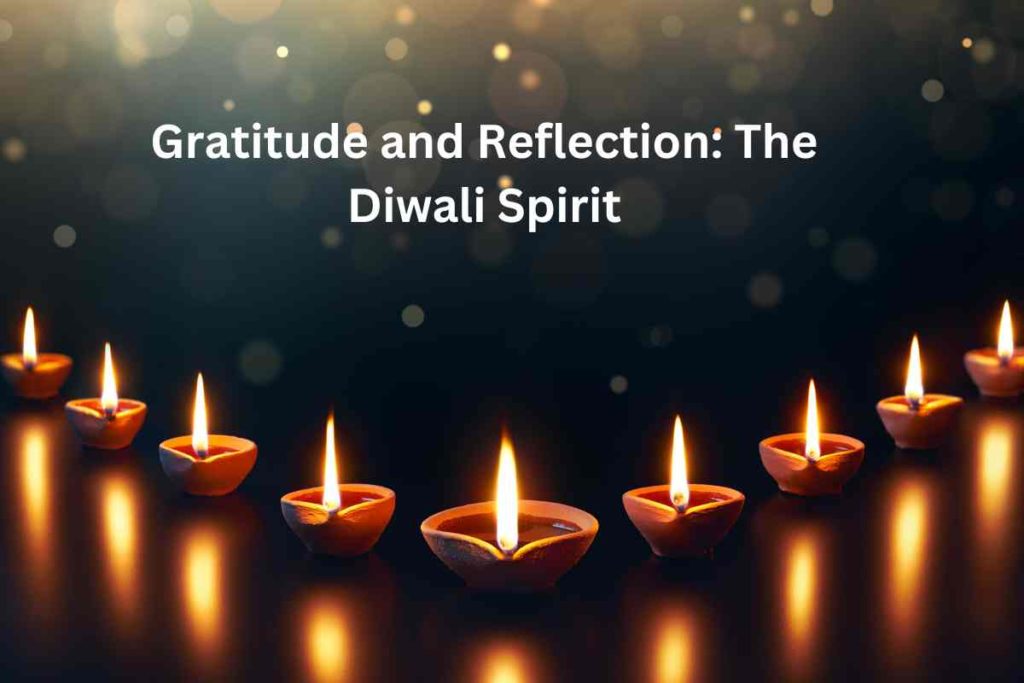Gratitude and Reflection: Diwali, also known as Deepavali, is more than just a festival of lights; it’s a celebration of gratitude and reflection. This article delves into the profound Diwali spirit, emphasizing the values of thankfulness and introspection that make this festival not only visually stunning but deeply meaningful.
The Essence of Diwali
Diwali is one of the most widely celebrated festivals in India and by people of Indian origin around the world. At its core, Diwali signifies the victory of light over darkness and good over evil. It commemorates the return of Lord Rama, along with his wife Sita and brother Lakshmana, from their 14-year exile after defeating the demon king Ravana.
The Significance of Gratitude
Gratitude is a central theme of Diwali. As families and communities come together to celebrate, they express their thankfulness for the blessings they’ve received throughout the year. Gratitude is not merely a feeling but a way of life during this festival.
Self-Reflection during Diwali: Gratitude and Reflection
Diwali encourages self-reflection, a time to contemplate one’s actions and choices. It’s an opportunity to assess personal growth, set new goals, and let go of negativity. The lighting of lamps is symbolic of illuminating the inner self, dispelling darkness, and fostering self-awareness.
Acts of Kindness and Charity
Acts of kindness and charity are integral to the Diwali spirit. Families and individuals make an effort to help those less fortunate, whether by donating to charities, distributing food to the needy, or simply offering a helping hand to neighbors. These acts of kindness reflect the essence of the festival – spreading joy and positivity.
Strengthening Family Bonds
Diwali is a time when families come together, regardless of geographical distance. It’s a time to strengthen familial bonds, share meals, and create lasting memories. Elders impart wisdom to the younger generation, passing down cultural traditions and values.
Celebrating Cultural Diversity: Gratitude and Reflection
Diwali transcends religious and cultural boundaries. It’s celebrated by people of various faiths, promoting interfaith harmony and unity. The diversity in how Diwali is observed adds to its richness and inclusivity.
Conclusion: Embracing the Diwali Spirit
In conclusion, Diwali is more than just a festival of lights; it’s a celebration of gratitude, self-reflection, and acts of kindness. It’s a time to strengthen family bonds and embrace cultural diversity. As the lamps are lit and homes are adorned, the Diwali spirit shines brightly, reminding us to be thankful for what we have, reflect on who we are, and spread kindness and love to all. Diwali teaches us that true wealth lies not in material possessions but in the richness of our hearts and the light of our souls.
FAQs: Gratitude and Reflection
Question 1: What is the significance of Diwali?
Answer:- Diwali signifies the victory of light over darkness and good over evil. It commemorates the return of Lord Rama from his exile after defeating the demon king Ravana.
Question 2: Why is gratitude important during Diwali?
Answer:- Gratitude is important during Diwali as it reflects the essence of the festival. It’s a time to express thankfulness for the blessings received throughout the year.
Question 3: How is self-reflection encouraged during Diwali?
Answer:- Diwali encourages self-reflection through the lighting of lamps, symbolizing the illumination of the inner self and fostering self-awareness.
Question 4: Why are acts of kindness and charity significant during Diwali?
Answer:- Acts of kindness and charity are significant during Diwali because they reflect the essence of spreading joy and positivity. It’s a time to help those less fortunate and make a positive impact on the community.
Question 5: How does Diwali strengthen family bonds?
Answer:- Diwali strengthens family bonds by bringing families together, fostering togetherness, and providing an opportunity for elders to pass down cultural traditions and values to the younger generation.
